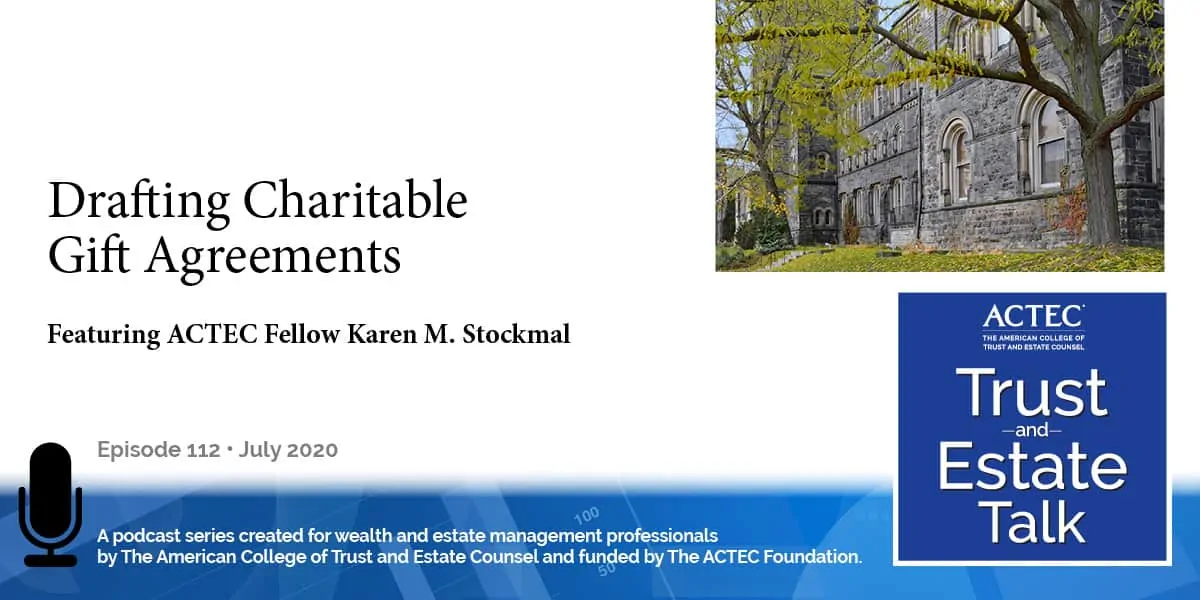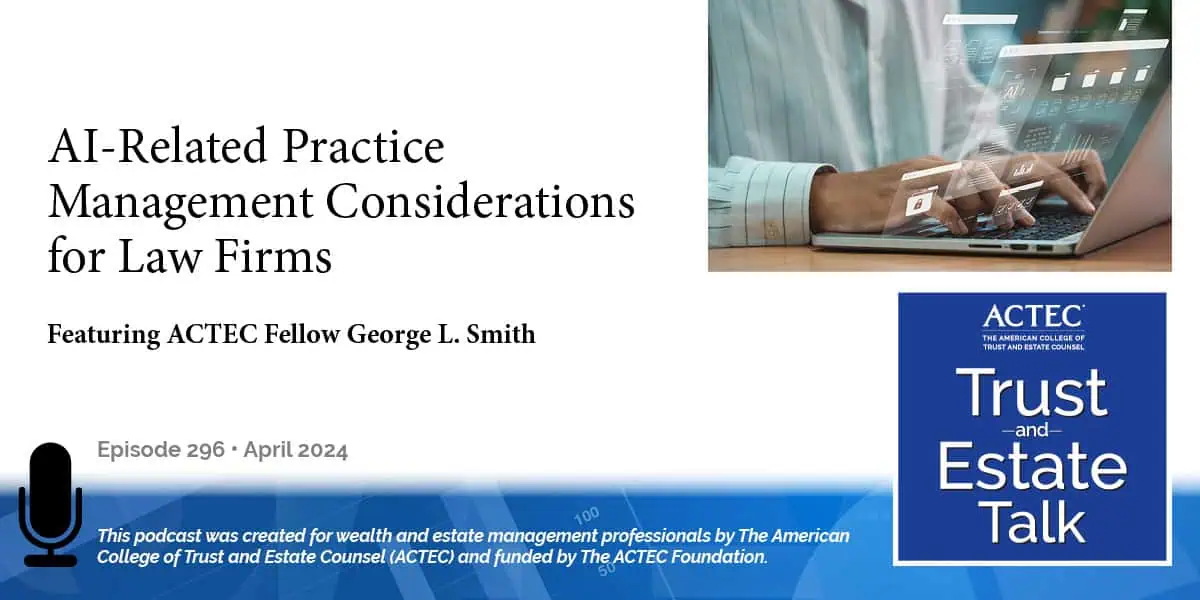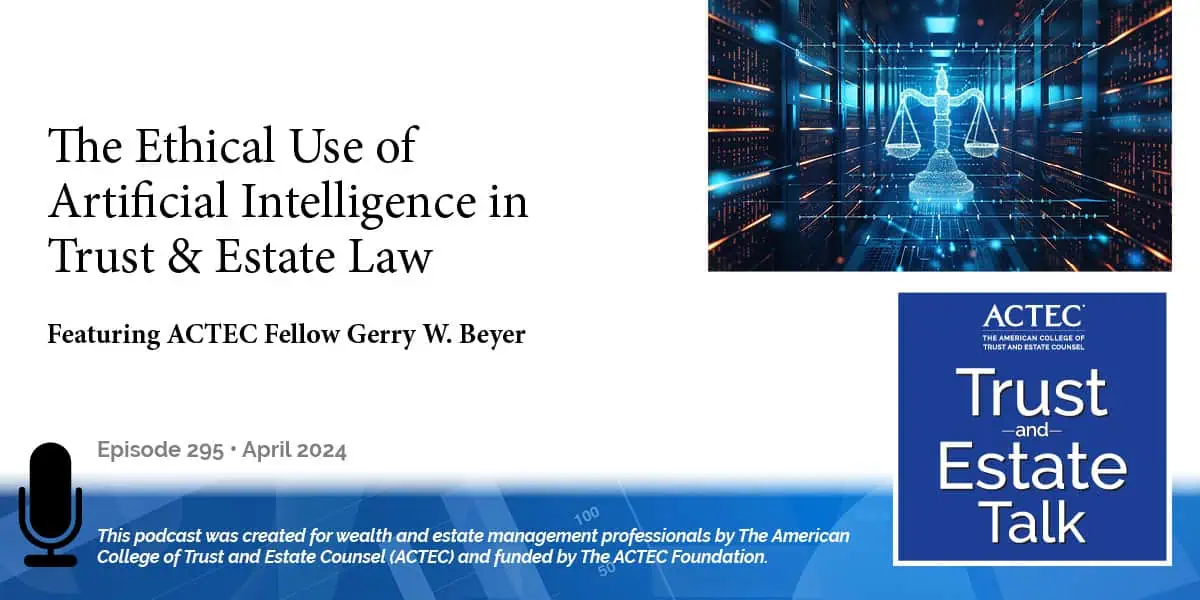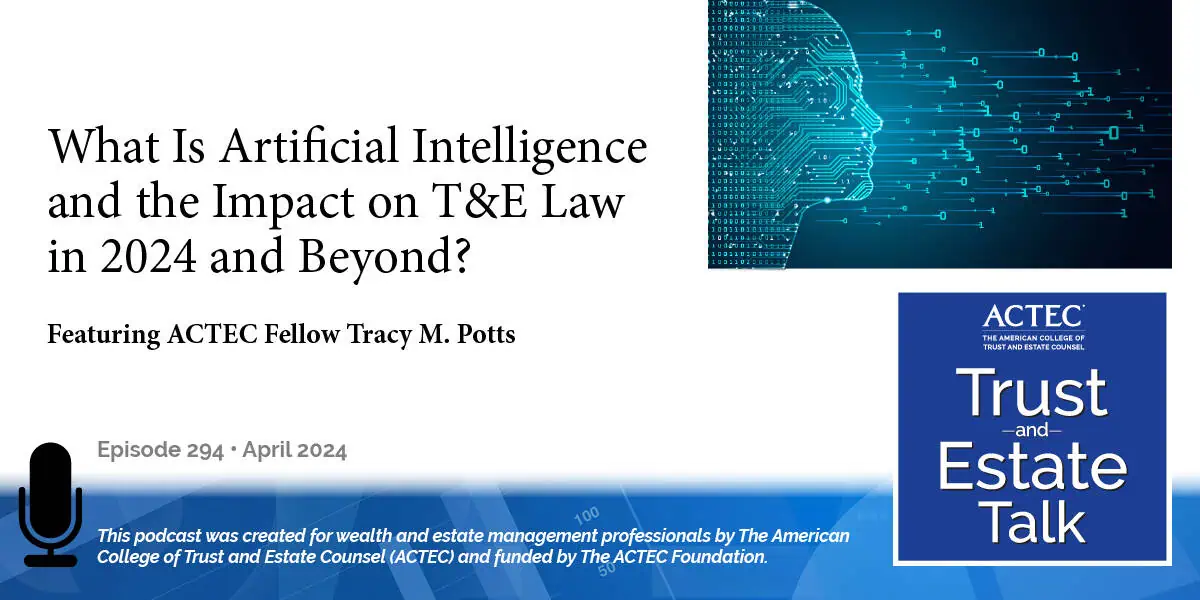Drafting Charitable Gift Agreements

“Charitable Trust Agreements,” that’s the subject of today’s ACTEC Trust and Estate Talk.
Transcript/Show Notes
This is Kevin McCrindle, an ACTEC Fellow from Waterloo, Iowa. Whether you are representing a charity or a donor, you need to be prepared to negotiate and draft an agreement to protect your client. To give us more information on this topic, you will be hearing today from an ACTEC Fellow, Karen Stockmal of Berwyn, Pennsylvania. Welcome, Karen.
Thanks, Kevin. Today’s topic, drafting charitable gift agreements, is particularly interesting for anyone who is working with nonprofit companies, universities, hospitals or donors–people who want to create a legacy, not only in their estate plan for their own family but also perhaps for the public. Several things that we have seen lately in the media have led us to consider what are important things that we need to think about before we counsel our clients when it comes to making charitable donations that have some sort of expectation surrounding them. For example, if you have a client who is looking to make a donation to perhaps a university in order to name a building, an endowment that will bear their family name, one needs to think about whether or not circumstances may change in the future, and that building, for example, may not always be there.
So, in counseling the client, or in the case of representing the nonprofit, thinking about whether the charitable gift agreement should include specific options for changes in circumstances is going to be very important. Expectations are everything when we are working with clients. So letting them know that either their name will be on the building, so long as the building continues to exist, or for example, that the university may agree that if the building needs to be replaced or moved at some point in the future, that they would be given a first right of refusal to renew their gift in a new building or renovated building or giving them, for example, a term of years to know that their building would be named at a minimum for a period of years or a generation until the death of the donor or perhaps the donor’s children would all be workable. The examples that we see in the media where donors and nonprofits clash are where these types of expectations aren’t discussed in advance. Similarly, when counseling clients, it’s important that they realize even in a context of creating an endowment, that they are relinquishing a great deal of control over the funds. For example, there are many cases that have been in the attention of the media where donors have created an endowment, perhaps for a university, and in exchange asked to be appointed to a hiring committee or to be consulted on policy matters of the university. While at times even these kinds of agreements are documented, they may prove impractical if the management of the nonprofit changes hands. For example, a new dean in a college who was not present when the agreement was drafted may come in with new priorities, new ideas and not be willing to meet these constructs. So, even careful and detailed drafting may not eliminate every problem or concern that we can foresee. Therefore, reminding the client that while they are alive, perhaps the university has agreed to try in every way to uphold the agreement, the client still needs to understand that there may be unforeseen changes in the mission and management of the nonprofit. Adopting a flexible mentality is well advised.
One other question that often comes up with donors is relative to who can enforce this agreement if they are no longer there, because many of our donors are looking to create a legacy that goes beyond their lifetimes. They may wish for their spouse, children, or other personal connections to be successor advisors on how a gift should be implemented when they are no longer able to. At times, this can be very useful in clarifying the donor’s intent relative to the gift. However, as we get further and further away from the donor, one, two or even three generations down, it’s very possible that they know even less about what the donor intended than the institution itself; and they may not have the same perspective that the donor had. The question of whether a family member or a personal representative of a donor’s estate has standing is governed by state law. And in particular, there is a tension between the idea that the attorney general and the attorney general’s office as a representative of the public–the beneficial interest of nonprofits–should be the institution that enforces donor intent, or should it be individuals?
In some states, both can have standing, particularly where the documentation and the facts leave that to the correct conclusion. However, families need to understand that standing is not a given. They also need to understand that it is extremely rare that money that has been donated, without an expressed condition, would come back to the family.
One of the suggestions that has been given in several instances in drafting is if there is a condition which must be met in order for the gift to be received by the institution, creating an alternative contingent charity, which would then receive the gift if the contingency is not met. So, for example, if we have a donor who says they would like to spur fundraising at a local hospital, that donor might donate $5 million to the hospital contingent upon the hospital raising matching funds over the next five years. If the hospital is unable to match those funds, the portion which is unmatched would then come to the donor’s donor advised fund, in which the donor then has the ability to re-gift to a different nonprofit institution. In that way, we have a clear contingency, a clear time period in which the contingency must be met and an alternative nonprofit which is also a 501(c)(3) so that we know where the money needs to go.
Looking at all of these different aspects, when counseling both clients and nonprofits as well as remembering that a charitable gift agreement is a contract and needs to include the basic rules and tools of contracts such as a situs clause, it should include a counterpart clause as well as a merger clause. Very important in making sure that the client understands that there are no side agreements and that anything that has been discussed is either in the agreement or has been left on the table and will not be part of the agreement. Correctly identifying the parties, the donor and the donee, whether it’s the donor’s personal funds, the donor’s donor advised fund or the donor’s trust is also important. When we think about these things and sit down with a client who wants to make a donation, or an institution that’s considering receiving a donation, expectations are everything. Making sure that you think about things that will change in the future, and that everyone is clear that this is a gift, will go a long way.
Thank you, Karen, for educating us on charitable gift agreements.
You may also be interested in An Introduction to Charitable Pledges and A Primer on Private Foundations.
This podcast was produced by The American College of Trust and Estate Counsel, ACTEC. Listeners, including professionals, should under no circumstances rely upon this information as a substitute for their own research or for obtaining specific legal or tax advice from their own counsel. The material in this podcast is for information purposes only and is not intended to and should not be treated as legal advice or tax advice. The views expressed are those of speakers as of the date noted and not necessarily those of ACTEC or any speaker’s employer or firm. The information, opinions, and recommendations presented in this Podcast are for general information only and any reliance on the information provided in this Podcast is done at your own risk. The entire contents and design of this Podcast, are the property of ACTEC, or used by ACTEC with permission, and are protected under U.S. and international copyright and trademark laws. Except as otherwise provided herein, users of this Podcast may save and use information contained in the Podcast only for personal or other non-commercial, educational purposes. No other use, including, without limitation, reproduction, retransmission or editing, of this Podcast may be made without the prior written permission of The American College of Trust and Estate Counsel.
If you have ideas for a future ACTEC Trust & Estate Talk topic, please contact us at ACTECpodcast@ACTEC.org.
© 2018 – 2024 The American College of Trust and Estate Counsel. All rights reserved.
Latest ACTEC Trust and Estate Talk Podcasts

AI-Related Practice Management Considerations for Law Firms
A discussion for law firms about how to incorporate AI in their practice management, including staff considerations, the “billable hour,” and more.

The Ethical Use of Artificial Intelligence in Trust & Estate Law
A law professor offers insights into the risks, rewards, duties and ethical considerations of lawyers using AI in their T&E practices.

What Is Artificial Intelligence and the Impact on T&E Law in 2024 and Beyond?
A primer on the types and uses of AI, then a deeper dive into the impact on trust and estate law from types to applications to ethical considerations.

